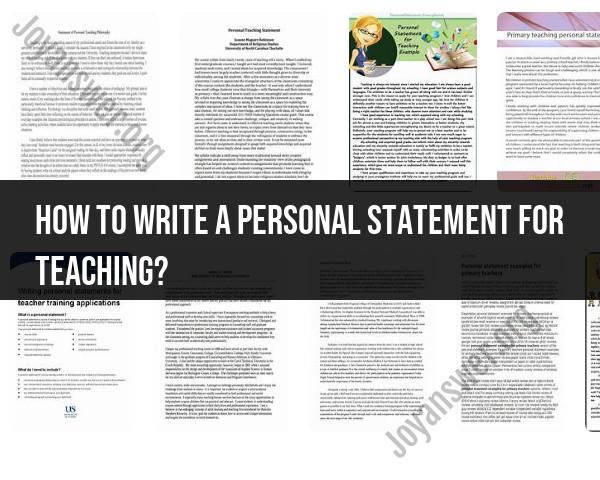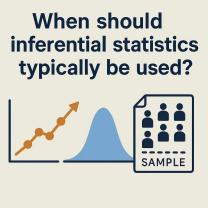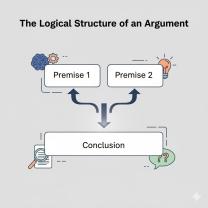How to write a personal statement for teaching?
Writing a compelling personal statement for teaching is crucial when applying for teaching positions or education-related programs. This statement provides an opportunity to showcase your passion for teaching, your qualifications, and your philosophy of education. Here are some steps to help you write an effective personal statement for teaching:
Research the Institution or Program: Before you start writing, research the school, district, or program you are applying to. Understand their mission, values, and the specific qualities they are looking for in a teacher. Tailor your statement to align with their expectations.
Begin with a Strong Introduction:
- Start your personal statement with a captivating introduction that grabs the reader's attention. You might use a personal anecdote, a quote, or a thought-provoking statement related to teaching.
Highlight Your Qualifications and Experience:
- Provide a summary of your relevant qualifications, including your educational background, certifications, and teaching experience. Be specific about the grade levels and subjects you have taught or are qualified to teach.
Share Your Teaching Philosophy:
- Explain your teaching philosophy and approach. What are your beliefs about education, student learning, and classroom management? How do you engage and inspire your students?
Showcase Your Achievements and Impact:
- Highlight your accomplishments as a teacher, such as improved student outcomes, successful projects, or innovations you've introduced in the classroom. Use concrete examples and data, if possible, to demonstrate your effectiveness.
Emphasize Your Passion and Dedication:
- Express your enthusiasm and commitment to teaching. Discuss why you are passionate about educating students and how you make a difference in their lives.
Demonstrate Adaptability and Collaboration:
- Explain your ability to adapt to diverse classroom settings, meet individual student needs, and work collaboratively with colleagues, parents, and administrators.
Address Challenges and Growth:
- Acknowledge any challenges you've faced as a teacher and how you've overcome them. Show your willingness to learn and grow in your profession.
Include Personal Values and Ethics:
- Share your personal values and ethical principles that guide your teaching. Discuss how you promote a positive and inclusive classroom environment.
Connect to the School or Program's Values:
- Reinforce your fit with the institution's values and goals. Explain how your teaching style and philosophy align with their mission.
Conclude with a Strong Closing:
- End your personal statement with a strong conclusion that reinforces your commitment to teaching and your eagerness to contribute to the school or program.
Edit and Proofread:
- Review your statement carefully for grammar, spelling, and clarity. Consider having a trusted friend or colleague review it as well.
Stay Concise and Focused:
- Aim for a well-organized statement that is concise and to the point. Admissions or hiring committees often read many statements, so it's essential to keep it engaging and not too lengthy.
Avoid Clichés and Generalities:
- Steer clear of clichés and generic statements. Instead, provide specific examples and unique insights into your teaching journey.
Seek Feedback:
- It can be beneficial to seek feedback from mentors, colleagues, or professionals in the field to refine your personal statement.
Remember that your personal statement for teaching is a reflection of your unique qualities as an educator. Make sure your passion for teaching and your dedication to students shine through in your writing. A well-crafted personal statement can make a strong impression on those evaluating your application.
How to write an effective personal statement for a teaching position.
To write an effective personal statement for a teaching position, you should:
- Highlight your passion for teaching and your commitment to student learning.
- Share your unique skills and experiences that make you a qualified and effective teacher.
- Demonstrate your understanding of the teaching profession and your alignment with the school's mission and values.
- Write clearly, concisely, and professionally.
Key elements and components to include in a teaching personal statement.
Your teaching personal statement should include the following key elements and components:
- Introduction: Introduce yourself and your interest in the teaching position.
- Body: Share your teaching philosophy, skills, and experiences that make you a qualified and effective teacher.
- Conclusion: Summarize your main points and reiterate your passion for teaching and your commitment to student learning.
Examples of successful teaching personal statements and their impact.
Here are some examples of successful teaching personal statements and their impact:
- Example 1: A teacher who was struggling to find a job in a competitive market decided to include a personal story in her teaching personal statement about how her own teacher had inspired her to pursue a career in education. This story helped her to stand out from other candidates and land the job.
- Example 2: A teacher who was transitioning from teaching in a private school to teaching in a public school included a section in his teaching personal statement about his commitment to equity and inclusion. He explained how he would create a positive and supportive learning environment for all students, regardless of their background or abilities. This section of his personal statement helped him to demonstrate his alignment with the public school's mission and values.
Tailoring your personal statement to different teaching roles and institutions.
You should tailor your teaching personal statement to each teaching role and institution that you apply to. Be sure to highlight the skills, experiences, and qualifications that are most relevant to the specific position and school. You should also research the school's mission and values and incorporate those into your personal statement.
Tips for proofreading and improving the quality of your teaching personal statement.
Once you have written your teaching personal statement, be sure to proofread it carefully for any errors in grammar, spelling, or punctuation. You may also want to ask a friend, family member, or colleague to review your personal statement and provide feedback.
Here are some additional tips for improving the quality of your teaching personal statement:
- Be specific and provide examples to support your claims.
- Be honest and authentic.
- Be positive and enthusiastic.
- Avoid clichés and overused phrases.
- Proofread your personal statement carefully before submitting it.
By following these tips, you can write an effective teaching personal statement that will help you to stand out from other candidates and land your dream teaching job.













